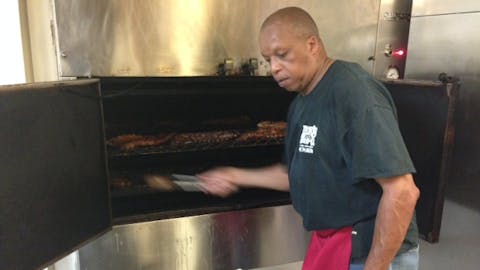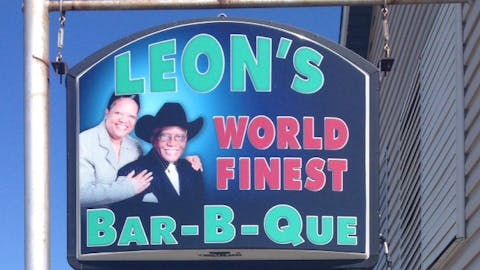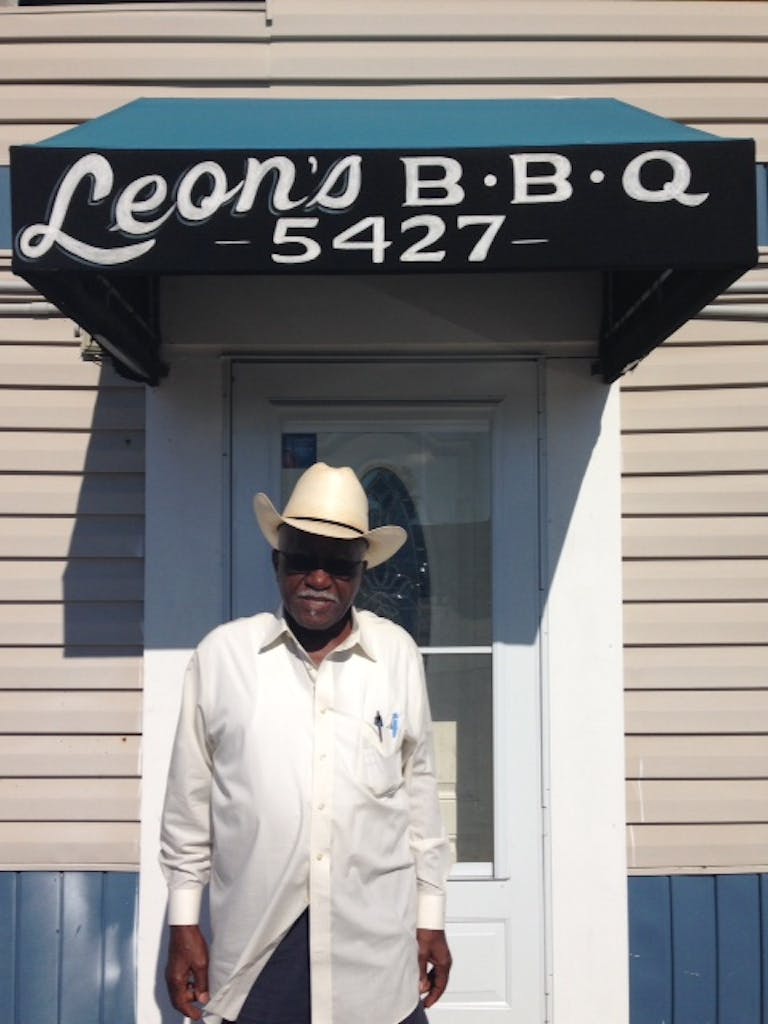 Owner/Pitmaster: Leon’s World’s Finest In & Out Bar-B-Que; Opened 1987
Owner/Pitmaster: Leon’s World’s Finest In & Out Bar-B-Que; Opened 1987
Age: 74
Smoker: Wood-fired Rotisserie Smoker
Wood: Post Oak
Leon O’Neal didn’t get into the barbecue business until he was forty-five years old, but he’s managed to be successful in Galveston for nearly three decades in a converted house that once contained his bail bonding business. He decided pretty quickly that barbecue was a better path in life.
O’Neal can usually be found in the small dining room of his restaurant, the walls of which are covered in newspaper clippings about the business. We sat at a table in the mid afternoon, and he insisted that I eat while we talked. The man’s customer service is polished, as evidenced by an exchange between he and a customer unhappy with her ribs. He was happy to replace her order, but explained to me after she left that she thought the ribs were too small, so he gave her some longer one from the middle. “She already had the best ribs from the short end, so I just gave her the next best thing in the house.”
Daniel Vaughn: What is your key to cooking good barbecue?
Leon O’Neal: The object of good cooking is slow heat. You got to have the best meat. You see that brisket? When you cut that brisket, if that brisket ain’t Choice it’ll turn blacker than me on the inside. When you go to those barbecue houses and the meat’s dark, it ain’t Choice. It’s a step down.
DV: And you only use Choice meat?
LO: That’s what I buy. It costs me $3.29 per pound.
DV: Is that a lot more than it was last year?
LO: It was about $2.65 or $2.70 then. It went up tremendously.
DV: Did you change your prices?
LO: Oh yeah. I had to. It just makes a difference to run a cut above your competitors. You also have to keep it fresh, and you’ve got to keep it consistent. We also make our own seasonings and rubs, and we make our own sauce. Either I make it, or my son Gregory makes it. We’ve been doing it like that for the past twenty-nine years.
DV: When did you develop all those recipes?
LO: At the very beginning. I already understood the seasonings, and we just took it to another level. We use black pepper, white pepper, red pepper, chile powder, salt, granulated garlic, granulated onion, dehydrated brown sugar. It’s nine spices and we just put it all together.
DV: Is that the rub you use on all the meats?
LO: That’s right. Every time.
DV: When you opened the business back then, was it in this building?
LO: Yes. Bev’s Little Enterprise was here before. It was a beer joint.
DV: What led you to open a barbecue joint here?
LO: Well, we started off with a bonding service upstairs. Went they got out they stopped paying their bills. They always came up with a sad story. We had to get out of the business, so we moved downstairs. I’ve been a cook all my life, so this is what I wanted to do. Once I got into it I realized it was kinda fun.
DV: Is it still fun?
LO: Oh yeah. If you don’t like it you’ve got to get out of it.
DV: And what were you doing before you opened this place?
LO: I was a soldier, a two-time Vietnam vet. I was in the Army for twenty-five years, then I retired.
DV: Did you cook in Vietnam?
LO: Oh yeah. That’s what I did when I was in the Army. I was on the general staff. I cooked for the one, two, three, and four star generals.
DV: Where did you learn to cook?
LO: I went to cook school at Prairie View A&M and got my degree in culinary arts. Then I went to the cook school for the Army in Fort Lee, Virginia. I’ve been cooking for a while [laughing].
DV: Did you get to cook barbecue in the Army?
LO: Yes. They’d pull a big trailer, and we’d have a barbecue. They’d all say “rah-rah” and I got a lot of high fives.
DV: Was barbecue part of the curriculum at Prairie View?
LO: Well, I didn’t quite understand it as I do now. I worked on the little highway where they had frog legs and that sort of thing. Barbecue was just coming in. That was in ’58 or ’59.
DV: Barbecue wasn’t as popular in that area back then?
LO: Not as popular as it is now. Right.
DV: What was the barbecue market like in Galveston when you opened up?
LO: There were several in town. There have always been a few barbecue kings in this town.
DV: These downtown links are so unique and so good. Where did the recipe come from?
LO: It developed out of the Beaumont area. I picked up on it. I got a recipe and then made it better. I perfected it. We make them right here. They have crushed red pepper, garlic, onion, salt, chile powder…fresh garlic is key.
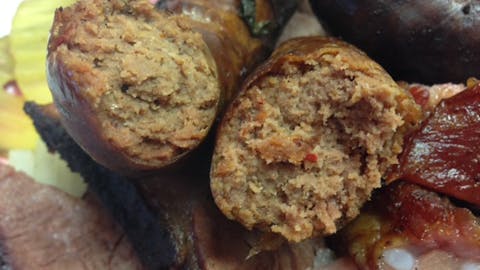
DV: In Beaumont they have a lot more fat in them. I mean it just gushes out.
LO: That’s one of the things that I did. I made it more lean. Back in the day you’d poke that sucker and it would jump all the way up to the ceiling, but that was back then. This is a new generation. They like it lean, but you still have to keep it juicy.
DV: I see that you charge a premium for extra lean brisket [at $21.45 per pound, it’s the most expensive brisket I’ve seen in the state].
LO: Well, you’ve got to. Some folks don’t like no fat. About three percent of customers, that’s all they eat. You have to cut off all the fat. You have to take the price up a little bit.
DV: On the other end of the spectrum is “Leon’s cut” [the fatty end for $16.45 per pound].
LO: You’ve got some of that on your plate.
DV: Is that what you prefer?
LO: I eat a little of all of it, but that’s what I like.
DV: Do you still like eating your own barbecue?
LO: Oh yeah. I eat it every day. I have green beans every day too.
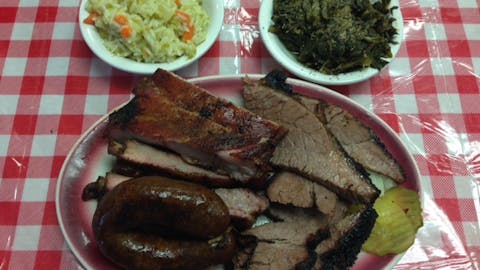
DV: Do you eat other people’s barbecue?
LO: All the time. When I go up that east coast I take 95 going north. We were just up there in August going up to Philadelphia. I took off two weeks. One of the little places said they only sold ribs in half or full racks. It’s fine, but they put that barbecue sauce all over it.
DV: Do you remember what city or state you were in?
LO: That was just south of Atlanta.
DV: Do you eat any other barbecue in Texas?
LO: Oh yeah. I go to Huntsville often and I eat at that little church there [New Zion Missionary Baptist Church]. I like to get sliced beef and ribs. I stay away from that chipped beef. Anybody can chip some barbecue and spread it over a bun.
DV: Are you originally from Galveston?
LO: No. I grew up in Brazoria County. I moved here after I retired. My brother was here.
DV: That’s mainly agriculture out there. Did you grow up on a farm?
LO: Yeah. Angleton was where the fair and the livestock show was. I raised a pig for the fair. It was amazing and a lot of fun.
DV: How’d you do with that pig?
LO: I got first place. Then I got a job while I was in school at the packing house. I learned how to cut meat at an early age – sixteen or seventeen. I knew every cut of the beef and it stayed with me. I never thought I would use it this far, but I was always involved in the cooking arena. I cooked for the football team. I made cakes and lemon chiffon pies along with meat loaf and smothered seven steaks. These seven steaks now aren’t tender like they used to be.
DV: Did you or your family cook barbecue back then?
LO: When I was seven or eight my daddy worked for Halliburton when they were building roads in Brazoria. On the weekends they’d have a barbecue. They’d kill a steer or a heifer and butcher it up. They’d season it. My daddy would dig a hole that was about four feet deep, five feet wide, and eight feet long. That heat can’t do anything but come up from that hole. It can’t go out, only up.
DV: Would they put the half steer on there, or cut it into smaller pieces?
LO: They’d break it down. They’d kill hogs too.
DV: Did your dad do all the cooking?
LO: He was in charge, but he had a crew that was ten or twenty depending on the size of the party.
DV: Did they mop the meat while it was cooking.
LO: Oh yeah. He’d make that mop seasoning. It had lemon, salad oil, Worcestershire sauce, onion, salt, pepper, and fresh garlic.
DV: Of course you came into barbecue when you grew up with a cook like that for a dad.
LO: I was just a kid. Sometimes they would even cook it right down in the ashes.
DV: Did he do other work for Halliburton, or just cook?
LO: He was a truck driver and he would do odds and ends. He wasn’t a craftsman, but a general laborer. That was in the forties and fifties.
DV: And your son Gregory works with you now.
LO: Yes, He works Saturday, Sunday, Monday, and Tuesday. That’s the only days he works. Three or four days is enough for him, but he makes the sauce faithfully.
DV: Do you have other family members involved in the business?
LO: That’s my sister right there. My cousin over in Pearland has a barbecue place called Sydney’s and Leon’s World’s Finest BBQ.
DV: Do you have other locations?
LO: I had one at 14th and the Strand, and I had one in Lakeland, Florida in 1999 and 2000. They’re closed now. I moved to Florida and was there for two and a half years. Customers were calling me and telling me to come back. I came on back, but for a while I just wanted to do something different.
DV: So you had a mid-life crisis a little late at sixty?
LO: I guess. I also have a franchise in Lanham, Maryland. They came through my school for two weeks.
DV: You have an Ole Hickory rotisserie smoker, but I still see the old pits in the smokehouse out back.
LO: We still use it. I’ll fire it up around Thanksgiving for that overflow. People bring their meat in for us to cook. Those turkeys just take time. It’s my back up.
DV: It’s obvious where the name came from, but where did the “World’s Finest” part come from?
LO: I picked that up when I was a soldier in Washington DC. It wasn’t about barbecue, but there was this place that advertised the world’s finest pit. There was a line around the block, so I got in line to see it. It wasn’t any bigger than this table, but the smoke went out through the ground in a duct instead of going up. It was in Southwest Washington D.C. That was way before I ever thought I’d do this, but it always stuck.
DV: What about the “In & Out” part?
LO: You can eat it in, or take it out. It’s also about that inside and outside cuts of the brisket.
DV: How has your menu changed since you first opened?
LO: We’ve added the desserts and macaroni & cheese I’ve only been serving the downtown links for seven or eight years.
DV: What about the link du jour?
LO: That’s a sliced sausage link.
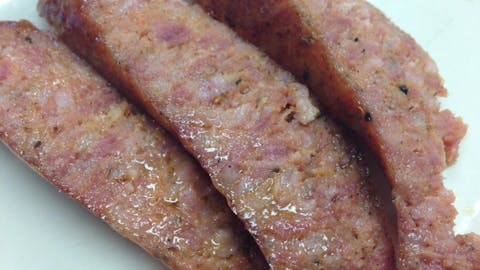
DV: Does that change daily?
LO: No. It’s just a different person making it. I started with Meyer’s in Elgin, then I went to Ninth Street Meat Market in Texas City. Now York’s out of Santa Fe make my links now. They make how I ask them to. They have garlic and sage. That smell of that sage is what brings it on.
[Leon answers his phone “Dr. BBQ.”]
DV: Where did the name Dr. BBQ come from?
LO: I had a lot of customers who came in who were doctors. One of them said I needed a doctor name, so he called me Dr. BBQ. It just radioed and radioed from there, and now it’s Dr. BBQ.
DV: You made the Top 50 BBQ list in Texas Monthly in June. Did that have any effect on your business?
LO: I get a lot of customers who come in here who read that Texas Monthly. They find me by word of mouth and on that Yelp and Google. A few weeks ago they were in here filming for the Travel Channel. It’ll be on the beginning of next year. Summer of 2015.
DV: How long were they here?
LO: Just a day. There were twelve of them in here with cameras.
DV: Did you have to shut down the restaurant?
LO: No. They were interacting with everyone, the folks in the restaurant and the staffers.
[We paused the conversation here for a tour of the kitchen and the pits.]
DV: What kind of wood are in these piles here?
LO: It’s oak – dry oak.
DV: Is drying it out here the key?
LO: The sap in the wood with that water in there is what causes the after-belch. When it’s dry and clean, it’s clean all the way.
DV: Well, you’ve been at this business for a long while and you’re about to turn seventy-five. How many more barbecue years do you have in you?
LO: I’ll be around for another ten years, but I’m trying to turn it over to my son. I can’t do as much as I used to.
- More About:
- Black BBQ


